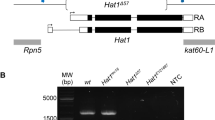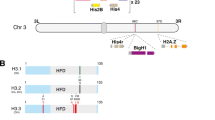Abstract
We found that Drosophila embryo extract contains a protein activity (or activities) that can destabilize nucleosomes, resulting in increased sensitivity to DNase I, release of nucleosomal supercoiling, high levels of conformational flexibility of DNA and more diffuse micrococcal nuclease digestion patterns. Incorporation of histone H1 did not significantly affect this nucleosome remodelling. Remodelling occurs more efficiently in hyperacetylated chromatin. It was shown previously that hyperacetylated chromatin, reconstituted in a Drosophila embryo cell-free system, exhibits increased DNase I sensitivity and a high degree of conformational flexibility of DNA. The present data suggest that the more diffuse structure of acetylated chromatin is a result of chromatin remodelling by protein activities in the Drosophila embryo extract.
Similar content being viewed by others
Author information
Authors and Affiliations
Additional information
Received: 4 November 1998 / Accepted: 10 May 1999
Rights and permissions
About this article
Cite this article
Krajewski, W. Histone hyperacetylation facilitates chromatin remodelling in a Drosophila embryo cell-free system. Mol Gen Genet 263, 38–47 (2000). https://doi.org/10.1007/PL00008674
Issue Date:
DOI: https://doi.org/10.1007/PL00008674




